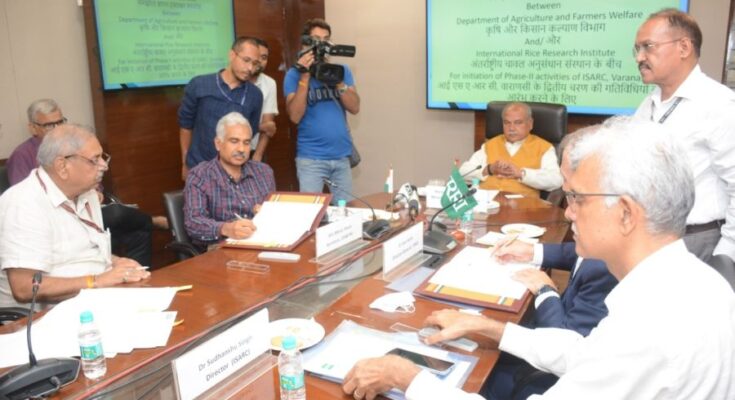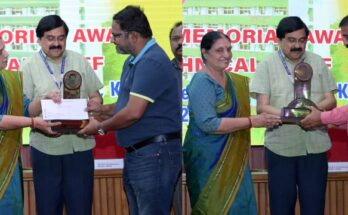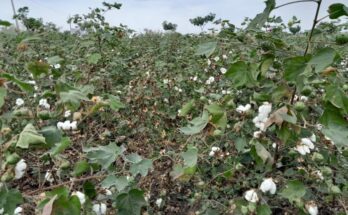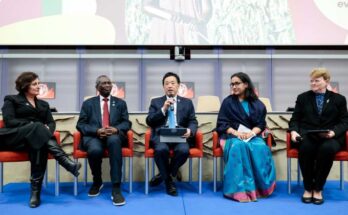In order to commence the phase -2 activities of IRRI South Asia Regional Centre (ISARC) to scale up the existing partnership for food and nutrition security in the South Asian region, Department of Agriculture & Farmer Welfare (DA&FW), Government of India and International Rice Research Institute (IRRI) signed a memorandum of agreement (MoA) in New Delhi on Tuesday. The agreement was signed by Manoj Ahuja, Secretary, DA&FW and Dr. Jean Balié, Director General, IRRI in the presence of the Union Minister of Agriculture and Farmers Welfare, Narendra Singh Tomar.
The ISARC was established following a union cabinet approval five years ago. ISARC also set up a Centre of Excellence in Rice Value Addition (CERVA) that includes a modern and sophisticated laboratory with capacity to determine quality and status of heavy metals in grain and straw. One of the critical achievements of CERVA is the development of one low and one intermediate glycaemic index (GI) rice varieties: IRRI 147 (GI 55) and IRRI 162 (GI 57), respectively, through the joint efforts of the CERVA team and IRRI HQ. Since most rice varieties are high in GI and most of the Indians consume rice, the popularisation of low GI rice varieties will reduce or even reverse India’s increasing trend of diabetes.
Prime Minister Narendra Modi had inaugurated state-of-the-art Speed Breeding Facility (SpeedBreed) at ISRAC in Varanasi on December 23, 2021. The facility is devoted to expedite the plant growth cycle of crops and enable advancing rice plants for five generations per year against only one to two under normal conditions. This plays a crucial role in transferring important traits (e.g., low GI, biotic and abiotic stresses) to popular Indian rice varieties in a shorter time.
The second phase of the ISARC programme proposes to increase farmers’ incomes, improve food and nutrition security, health, and well-being of smallholder farmers through increased system productivity, reduced yield gaps, enhanced climate resilience, mechanised and digital farming, improved market linkages, modernised value chains enabling entrepreneurship for women and youth, and capacity development.
You may also like to read: FMC India collaborates with PAU for Science Leaders Scholarship Program
In his brief remarks, Ahuja said the agreement would pave the way for undertaking further work towards the improvement of the welfare of farmers and ensuring food and nutrition security in India and the rest of South Asia. IRRI, especially ISARC, has long been an ally of the Indian government in addressing the most pressing issues concerning the agri-food sector, he said.
Speaking on the occasion, Dr. Balié said the ISARC is the first and biggest research centre of the IRRI across the world outside Philippines. He said the continuation of the agreement will help the capacity of rice-growing countries in South Asia, including India, and Africa in crop production, seed quality, and to enhance farmers’ income. It will also mitigate environmental and climate change challenges in rice cultivation, help fight global hunger and eradicate poverty, he added.
Activities toward meeting the objectives of the 2nd phase will be carried out through a trans disciplinary approach and leveraging cutting-edge technologies in three thematic areas over 5 years viz., (1) Centre of Excellence in Rice Value Addition (CERVA); (2) Centre of Excellence in Sustainable Agriculture (CESA) and (3) Centre for Education in Innovation and Research for Development (CEIRD).
Major objectives of the agreement
Main objectives include the development, dissemination and popularisation of high-yielding stress-tolerant and bio-fortified rice, particularly high zinc and low glycemic index rice; supporting national and regional rice breeding programmes to advance rice lines of specific and certified grain quality to increase producer and customer acceptance of new varieties to increase genetic gain; promotion of climate-smart varieties, natural resource management practices and climate-resilient agriculture through integrated geospatial data systems and tools, robust seed systems, dynamic agro-advisory systems, and scale-appropriate mechanisation; improvement of nutrient use efficiency (NUE), soil health, and water productivity in diversified rice agri-food systems for increased productivity and reduced environmental footprints; development of inclusive value chain-based business models (including farmer producer companies, business linkages, and entrepreneurship) for premium quality traditional varieties and value-added by-products; development of evidence-based strategies to improve women’s economic empowerment through entrepreneurial engagement in rice-based systems and engaging youth in sustainable transformation of these systems; and enhancement of local capacities, knowledge, and skills of all stakeholders through innovative human capital development solutions.
You may also like to read: India to include agriculture curriculum in school education
The Phase II activities follow the long-time cooperation between the Government of India and IRRI. In 2017, the union cabinet chaired by Prime Minister Narendra Modi approved the establishment of ISARC at the campus of the National Seed Research and Training Centre (NSRTC) in Varanasi. The Cabinet, in its meeting held on July 12, 2017, had approved the establishment of the ISARC and the operation of IRRI in India. Subsequently, the memorandum of agreement was signed on August 2, 2017 between the DA&FW and IRRI. The agreement was for 5 years from 2017-22 with a provision to extend for another 5 years subject to both sides mutually agreeing for the same.





